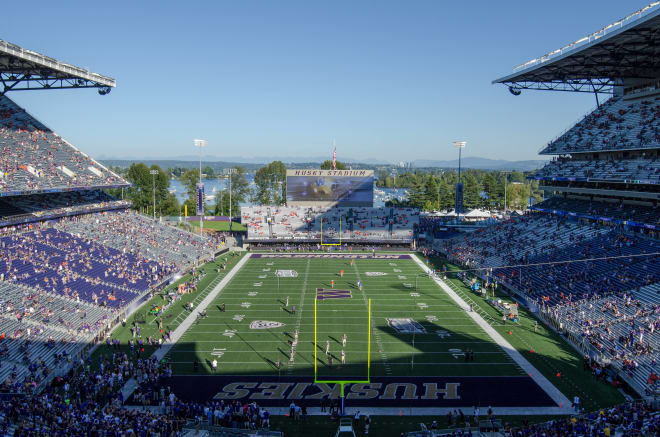Wolverine Watch: COVID-19 Cuts In On Dreams
In a perfect world, Jim Brandstatter would be dreaming of Union Bay on Lake Washington, watching the sailgaters lazily cruise up to Husky Stadium.
He’d anticipate the excitement of game day, especially a season-opening game day, in perhaps the most picturesque setting in college football. He’d consider feeling the pulse of the crowd, soaking in the boos from Washington fans as the young men in the winged helmets trot onto the field.
He’d join millions of others in welcoming back the thrill of yet another football season.
It’s not a perfect world. Far from it. In the consciousness of football fans, ventilators have blown away vertical leaps. A very different sort of facemask has intruded. Hydroxychloroquine debates have replaced Heisman discussions.
The specter of COVID-19 continues to change daily life in the United States, and far beyond. By comparison, football is small potatoes.
But when you’re a big potato farmer, you think about it.
So Brandstatter, the football play-by-play man for the Wolverines on the Michigan Radio Network, ponders like all U-M fans the start to the season — or lack thereof.

He knows that in Weidenbach Hall on the Michigan athletic campus, Athletic Director Warde Manuel is going through possible scenarios for what’s to come. When you’re running an athletic budget hovering around $200 million a year, and much of that comes from football, you’d better brace for any outcome.
“There is the prospect that there will not be the season,” Brandstatter noted. “We’ve got to face it. Everybody’s got to face it.”
On the one hand, that makes perfect sense. Nobody debates the most important aspect in all of this — keeping as many people whole as possible.
“The safety of the fans, the safety of the players, especially at the collegiate level, is uppermost in everybody’s mind,” Brandstatter said. “It’s a wait-and-see thing, just like it is for us, every day.”
But just like with the nation’s economic situation, there are other considerations as well. When it comes to Michigan athletics, every single cross country runner, rower, gymnast and softball player intensely wonders whether or not there will be a football season.
Their athletic fates hang on it.
“It would be devastating, economically,” Brandstatter said of a football shutdown. “I don’t think there’s any question about that.”
He noted having a conversation recently with his broadcast partner, former U-M All-American Dan Dierdorf. Dierdorf’s daughter, Katie, played basketball at Michigan, so he’s not completely football-centric when it comes to the Maize and Blue.
At the same time, he knows where the dollars come from.
“He was reading an article somewhere,” Brandstatter noted. “It was from about 2017, on the budgets of different programs. The budget that was highlighted was LSU, and LSU had three programs that actually made money — football, basketball and baseball.
“Basketball made a few million, baseball was above break-even, and football made like $64 million. The rest of their 29 sports all lost money, in the millions. If you take away three-quarters to 80 percent of your income for an operation, you’re out of business.”
A recent conversation with Michigan All-American swimmer Maggie MacNeil at one point touched on the thought of no season next winter.
She understands as well the overriding concerns. Her mother serves as a doctor in her native Canada, experiencing them every day.
Still, she doesn’t want to ponder a year in dry dock.
“I’m just trying to get through my classes now, online,” she said. “Some of my friends are convinced that next year will be online, too.
“I’m trying to just focus on that and keep positive. If anything changes too much going into next year, it will definitely be harder to see the bright side.”
Some wonder if the economic considerations will prompt some sort of fix to save the football season — the elimination of the non-conference schedule to buy time, even a winter-to-spring football slate.
But there are no guarantees, at this point. And the worst-case scenario isn’t a stretch.
“It is catastrophic,” Brandstatter said. “What you do with the rest of your athletic budget? You have no money to pay scholarships to students in track and field, or women’s basketball, lacrosse, wrestling, gymnastics, all of the ‘non-revenue’ sports people talk about.
“Where to they go? What do they do? What do athletic departments do? Eighty percent of your athletic budget just goes away. Goodbye. See ya. It’s no longer there.”
See ya, Lake Washington, and Wisconsin/Penn State at The Big House. Goodbye, Spartan Stadium and The ‘Shoe. Some don’t want to think about it. But…
“We’re all assuming that we’re going to have this Coronavirus thing figured out,” Brandstatter said. “I know at some point we will. But until we get a vaccine or an absolutely guaranteed treatment for correcting whatever the Coronavirus would cause for someone, it’s all wishful thinking. That trumps everything.”
---
• Talk about this article inside The Fort
• Watch our videos and subscribe to our YouTube channel
• Listen and subscribe to our podcast on iTunes
• Learn more about our print and digital publication, The Wolverine
• Sign up for our newsletter, The Wolverine Now
• Follow us on Twitter: @TheWolverineMag, @Balas_Wolverine, @EJHolland_TW, @AustinFox42, @JB_ Wolverine, Clayton Sayfie and @DrewCHallett
• Like us on Facebook

